Acoustic Signature Samba Turntable
| The Acoustic Signature Samba Turntable |
|
Paul Szabady |
|
6 June 2002 |
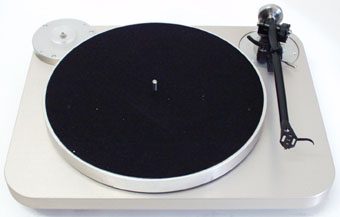 Specifications
Specifications
2 speed, thread driven, AC synchronous motor
Alloy construction
4 Kg platter
Outboard Alpha motor power supply
3-point elastomer/alloy spike feet with cups
Rega RB 250 arm and dust cover
VTA adjustor
felt platter mat.
Introductory Price: $1599
Address:
Distributor: Jerry Raskin’s Needle Doctor
419 14th Avenue SE
Minneapolis, MN 55414
Phone: 800-229-0644
Website: www.needledoctor.com
E-mail: info@needledoctor.com
Manufacturer: Peak High End
Weinbergstr. 27 D 71229
Leonberg, Germany
E-mail: info@acoustic-signature.com
Considering that the analog LP is now at least 8 format generations old, it’s encouraging to those who did not forsake the medium to see continuing development of playback quality. Turntables, tonearms and cartridges continue to evolve, and it is heartening to see new manufacturers entering the US market. To those discovering or re-discovering the musical virtues of the LP, the choice of reasonably priced, high performance products has never been better. The Acoustic Signature line of turntables from Germany made a big splash into the US market with The Final Tool turntable. The Final Tool is a rare achievement: it combines the rhythmic propulsion, drive, tempo and articulate phrasing, traditionally the province of the best UK tables, with the sharply delineated soundstage, wide bandwidth, deep bass, and huge dynamic swings that has tended to be the focus of US audiophile tables. Bank vault build quality, a successful utilization of high-mass principles, and a very reasonable price tag make it one of THE turntables to own.
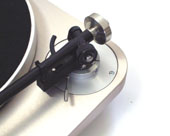 ‘m pleased to offer the first US review of the new Acoustic Signature Samba turntable. The $1599 (complete with Rega RB 250 arm and dust cover) Samba attempts to offer many of the Final Tool’s qualities at a reduced price with even simpler set-up and operation – the proverbial turnkey turntable. Set-up is absurdly easy: even the non-initiated will have little problem. The Samba’s more conventional footprint size and lighter weight allows non-fussy placement. Place the plinth on a flat surface, place the supplied cups under the 3 spiked damped feet, gently slip the easily managed 4 Kg alloy platter into the bearing holder and route the thread drive “belt” over the motor pulley and platter. Voila! Acoustic Signature even pre-ties the thread.
‘m pleased to offer the first US review of the new Acoustic Signature Samba turntable. The $1599 (complete with Rega RB 250 arm and dust cover) Samba attempts to offer many of the Final Tool’s qualities at a reduced price with even simpler set-up and operation – the proverbial turnkey turntable. Set-up is absurdly easy: even the non-initiated will have little problem. The Samba’s more conventional footprint size and lighter weight allows non-fussy placement. Place the plinth on a flat surface, place the supplied cups under the 3 spiked damped feet, gently slip the easily managed 4 Kg alloy platter into the bearing holder and route the thread drive “belt” over the motor pulley and platter. Voila! Acoustic Signature even pre-ties the thread.
The supplied Rega RB 250 arm pillar slides into the Samba’s arm height adjustor – a collar that clamps the arm with a single Allen head bolt. Loosen that bolt and the whole arm slides quickly out, making arm swapping, cartridge installation, and setting VTA/SRA a snap. The smaller and less sophisticated Alpha Power Supply (compared to Acoustic Signature’s more expensive tables) attaches by a foolproof computer-type D-shaped cable end with screws to hold it in place. A detachable AC cord (not included) supplies power and further tweaking potential for those inclined.
The physical appearance of the Samba is one of trim elegance and permanence. Constructed of the same alloy as its brother-in-arm The Final Tool, it is smaller and more elegantly balanced in appearance: less of a monument, but still possessing that aura of precision build quality for which German mechanical products have long been envied. Compared to The Final Tool, the overall weight of the table is far less, the platter being much lighter. The AC motor is attached to the plinth (decoupled by rubber isolation) rather than outboard in its own mount and the Alpha Power Supply is simpler (allowing only one turntable motor input for example.) The Samba’s feet combine compliance with their large alloy spikes, thereby aiding isolation, and nicely complement the appearance of the table.
I did not have a sample of the dust cover, as details of its construction were being finalized. Final price has also yet to be firmly set, but look to the Needle Doctor to have very attractive introductory specials.
The Samba is supplied with a felt mat. I also had a chance to sample a prototype of AS’s new optional screw-on record clamp. I auditioned the Samba with its felt mat, with the clamp, and with the Ringmat. I found the Ringmat to be far superior to the supplied felt mat: bass transients and articulation were far clearer, with none of the woolliness and out-of-focus smearing the felt mat produced, particularly with Grado cartridges. I’ve not generally been a fan of record clamps. In addition to their interruption of the flow of spinning discs because of the necessity to start and stop the motor with each LP change, I find too many of them kill the brio and effervescence of the playing, instilling a leaden and heavy-footed rhythmic pace. To its credit, the AS clamp did not induce this dullness and leadenness, but my overall favorite was still the Ringmat and all my observations are based on its use.
In addition to the supplied Rega RB 250 arm, I also used the Origin Live modified RB 250 and their Silver 250 arm. The Samba was definitely able to resolve the differences in these arms, so a tonearm upgrade path is not a waste of time and money if desired. The supplied RB 250 was an excellent match with the Samba: I felt no compromise or impediment to musical communication or clarity.
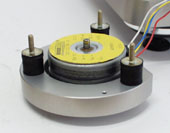 Some audio components are agonizing to review, requiring interpolation of their sound from a large number of applications to triangulate and to completely grasp. Sussing out the Samba is a snap: it’s 75% of a Final Tool. Everything The Final Tool did, the Samba did, only not quite as well. Bass was deep, tight, with excellent punch, articulation and rhythmic flow. While the bass was not quite as subterranean as The Final Tool, and with less impressive ultimate dynamic swings and force of impact, it did not compromise the music. Midrange clarity and high frequency response were of a high order. Soundstaging and imaging were portrayed with fine transparency: no vague fogging of the space between instruments, either laterally or front to back, occurred. Overall presentation was immediate, articulate and clear rather than laid back, mumbled and soft-focused.
Some audio components are agonizing to review, requiring interpolation of their sound from a large number of applications to triangulate and to completely grasp. Sussing out the Samba is a snap: it’s 75% of a Final Tool. Everything The Final Tool did, the Samba did, only not quite as well. Bass was deep, tight, with excellent punch, articulation and rhythmic flow. While the bass was not quite as subterranean as The Final Tool, and with less impressive ultimate dynamic swings and force of impact, it did not compromise the music. Midrange clarity and high frequency response were of a high order. Soundstaging and imaging were portrayed with fine transparency: no vague fogging of the space between instruments, either laterally or front to back, occurred. Overall presentation was immediate, articulate and clear rather than laid back, mumbled and soft-focused.
Musically, the Samba was highly communicative: drive, pulse, tempo, rhythm, phrasing, articulation and the expressiveness of subtle dynamic shifts of the playing were simply THERE. Communicating themeaning of the music is one of LP’s great strengths, along with believable tonality and the ability to differentiate and to flow with fine gradations of volume. The Samba delivered on all counts.
I ran my batch of representative cartridges through the Samba and could clearly hear their sonic signatures, strengths and limitations. Those fond of Grados (an excellent match for this arm and table) will be pleased to know that there was no hum. At one point I was listening to the $2500 van den Hul Frog with OL’s Silver 250 tonearm and, while this might be a gross dollar mismatch, it was definitely not a sonic or musical one.
Those looking for a simple set-up-and-forget turntable with some of the Giant Killer virtues of The Final Tool should go nuts over the Samba. It’s easy to set-up, satisfying to operate, and non-fussy in placement. I’m almost tempted to dub it “The Penultimate Tool.” No, it’s not as good as the Final Tool, and those whose budgets and systems allow purchase of the FT will gain substantial rewards. The Samba offers adroit rhythmic and dynamic skills, excellent orientation to the soundstage, fine detail, and an élan vital that makes listening to music a joy. Highly recommended.
![]()
Don’t forget to bookmark us! (CTRL-SHFT-D)
Stereo Times Masthead
Publisher/Founder
Clement Perry
Editor
Dave Thomas
Senior Editors
Frank Alles, Mike Girardi, Russell Lichter, Terry London, Moreno Mitchell, Paul Szabady, Bill Wells, Mike Wright, and Stephen Yan,
Current Contributors
David Abramson, Tim Barrall, Dave Allison, Ron Cook, Lewis Dardick, John Hoffman, Dan Secula, Don Shaulis, Greg Simmons, Eric Teh, Greg Voth, Richard Willie, Ed Van Winkle, Rob Dockery, Richard Doron, and Daveed Turek
Site Management Clement Perry
Ad Designer: Martin Perry


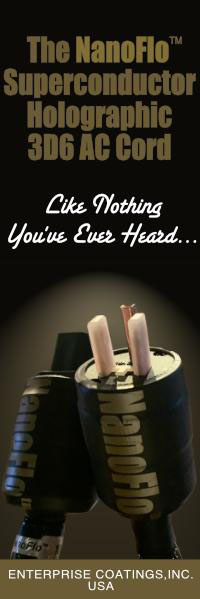
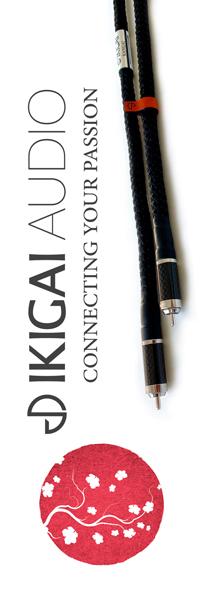
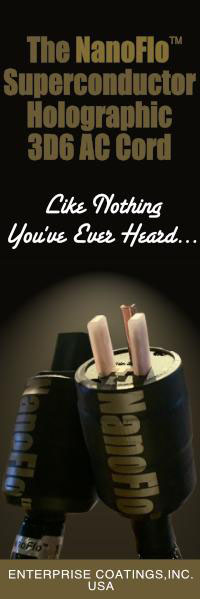
Be the first to comment on: Acoustic Signature Samba Turntable